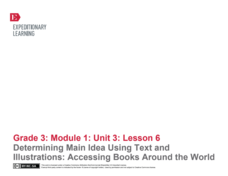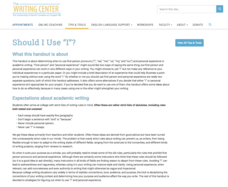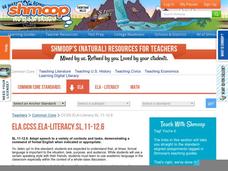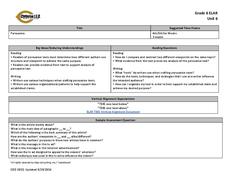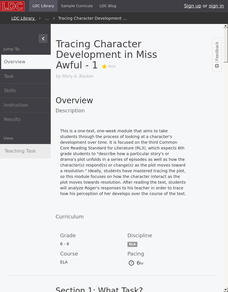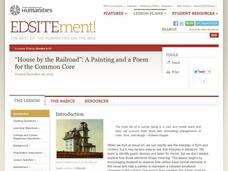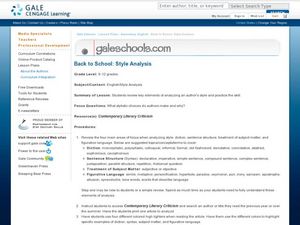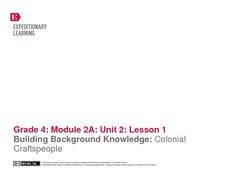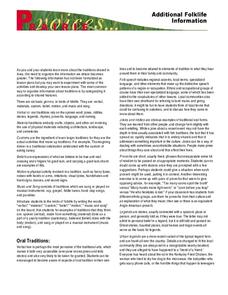EngageNY
Determining Main Idea Using Text and Illustrations: Accessing Books Around the World
Ease into informational text with the lesson suggested here. Part of a unit series, the lesson draws from previous lessons and acts as a natural moment to add in informational text. Class members read one section of My Librarian is a...
Worksheet Web
Analyzing the Text
Practice analyzing informational text with a reading passage that details the Great Depression. Scholars read about the impacts of World War I, the Roaring Twenties, and the Depression, then answer 10 true or false questions.
EngageNY
Grade 9 ELA Module 1, Unit 2, Lesson 4
As a mid-unit assessment, class members demonstrate their understanding of the concepts covered so far by crafting a formal, multi-paragraph essay in which they analyze how Rainer Maria Rilke's word choices develop the meaning and tone...
University of North Carolina
Should I Use “I”?
Despite the formal nature of academic writing, personal pronouns frequently appear in high school and college papers. While your first instinct may be to cross them out, sometimes it's okay to use them, an idea covered in a handout that...
University of North Carolina
Poetry Explications
Explication may sound like a fancy word, but it's just a fancy way to say analysis. Using a handout on poetry explications, part of a larger series on specific writing assignments, writers learn how to break down and analyze a poem. The...
Fluence Learning
Writing an Argument: Is Electronic Communication Helpful or Harmful?
Technology has undoubtedly improved the lives of people around the world—but has it improved communication? Seventh graders read two informative passages about the rise of texting and emailing versus in-person conversations before...
Curated OER
Using Words: Verbal Communication
Written and verbal communication is the topic for today. The class goes over various facets of verbal communication, such as plain English, active voice, passive voice, cliché, and jargon. They then use those devices as they discuss...
Curated OER
Introduction to Formal English
Ninth graders brainstorm different situations in which formal English is used. Individually, they describe how people would act if they were invited to the White House for dinner and what they would do. To end the lesson plan, they...
Curated OER
Formal and Informal Letters
In this formal and informal letters worksheet, pupils change eighteen informal words into formal words. Students then complete one informal and formal letter with fill in the blank answers.
Curated OER
Language Study: Slang
That slang is the bomb! A simple handout explains to learners what informal language is and when it is appropriate. After reading, have your class write a few sentences using both informal and formal English. They can trade papers with a...
Curated OER
Lesson 8: Summarizing Information
In this summarizing information worksheet, students read a featured article, summarize the article, identify the story's five W's and one H, and identify appropriate relevant facts.
Shmoop
ELA.CCSS.ELA-Literacy.SL.11-12.6
Sometimes it's all too easy to slip into informal language, ya know? Help your class master code-switching with the activity and drill provided here. The activity is a literature discussion where formal language is required. The...
EngageNY
Grade 9 ELA Module 3, Unit 1, Lesson 4
Can dogs feel shame? Explore the anthropomorphic connection between human emotions and animal behavior—or lack thereof—with a instructional activity about Temple Grandin's book, Animals in Translation. Ninth graders continue a close...
Cleburne Independent School District
Grade 6 English Language Arts and Readiness: Persuasive
What is the best way to compare and contrast viewpoints on the same topic? A persuasive writing unit plan addresses targeted skills, vocabulary, instructional strategies, and suggested resources that would be perfect for developing writers.
Literacy Design Collaborative
Tracing Character Development in Miss Awful
Scholars take a close look at Roger in Miss Awful. As the plot develops, readers track Roger's perceptions of his substitute teacher. Learners then discuss how Roger's actions toward the substitute changes as the story progresses before...
Curated OER
Test Your Writing Skills
In this letter writing skills worksheet, middle schoolers examine 15 phrases from letters and determine whether each phrase is from a formal or informal letter. Good, solid writing practice!
Curated OER
Letter Writing: Social Action Project
Help your pupils sharpen their letter writing skills. They compose business letters that include greetings, headings, closings, and a professional tone for a philanthropic organization requesting information. Use this resource to...
Curated OER
Can You Get the Signal?
What is a signal word? Recognizing these words is an important step in both reading and writing formal text. Review a list of signal words (provided and organized into specific categories), and then have your class play a game to...
Curated OER
"I Can” Common Core! 6th Grade Writing
It is impossible to know whether one has reached a goal without first knowing the goal. Help your sixth graders reach all the Common Core writing standards by giving them a checklist written in language they will understand. As you teach...
National Endowment for the Humanities
“House by the Railroad”: A Painting and a Poem for the Common Core
Introduce your class to ekphrastic poetry with an exercise that asks them to examine Edward Hooper's painting House by the Railroad and Edward Hirsch's poem "Edward Hopper and the House By the Railroad." After a close reading of the two...
Curated OER
Back to School: Style Analysis
Jump back into expository writing and analysis at the start of a new school year! Start with a review of an authors' stylistic choices in diction, syntax, treatment of subject matter, and figurative language. Writers choose a text to...
EngageNY
Building Background Knowledge: Colonial Craftspeople
In the first lesson plan of this unit on colonial trade, fourth graders gain background knowledge of different jobs performed by early colonists. The class begins with a slide show presentation that includes a variety of great...
Scholastic
Writing to a Historical Poet
Poetry is a very personal and introspective art form. Give your class the opportunity to understand how a poet's voice can speak to them on a personal level, and that every reader can respond to an author differently. After a poetic...
University of Northern Iowa
Additional Folklife Information
Use a packet packed with ideas for how to celebrate the traditions of your country, state, community, and pupils's families. Suggestions for how to draw on oral and material traditions, customs, beliefs, music, and stories all find a...
Other popular searches
- Formal and Informal Language
- Formal vs Informal Language
- Formal Informal Language
- Formal vs. Informal Language


